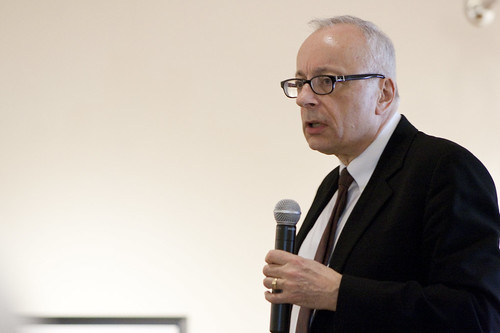In the pages of The Chronicle (here), William Germano (Dean and Professor at Cooper Union Faculty of Humanities and Social Sciences) offers his reflections on the end of Series Q, a book and journal line published by the Duke University Press. The Duke U Press blog described Series Q succinctly in its notice (here) of the death of Eve Sedgwick:
More than just a Duke author, Sedgwick helped to define the Press as we went through major editorial changes in the 1990s. In 1992, along with Michèle Aina Barale, Michael Moon, and Jonathan Goldberg, she founded the influential Series Q, helping to found the discipline of queer theory. Under her guidance, Duke Press has become a leader in that field; Series Q now includes 42 books.
Apparently, the Duke U Press has decided to end the series.

William Germano; image source: flickr.com
Dean Germano, who is the former publishing director at Routledge, writes this about the genre of academic publishing that might loosely fall under the heading of “LGBT Studies”:
Someone once remarked to me that scholarly publishing in gay studies was a conflict between the nerdy and the naughty. A lot of history of sexuality and a lot of philosophizing, often producing books that were too dense for the general reader with whom their authors were eager to communicate. “Don’t overthink it,” someone might have said back in those heady days of gender theory. But it seems that in academia, we sometimes have to overthink before we can think. Complex thinking and complex writing have been tools of legitimation in every academic field. That may be one of queer theory’s unintended lessons.
What else have we learned? If a field remains, it isn’t a coherent one. By one metric—the presence of robust publishing programs—”gay studies” now marks only a historical trace. You’d be hard-pressed to find a bookstore with a first-rate selection in the discipline, and compared with 1993 you’d have to look a lot harder to find a good bookstore, period—except online.
We’ve also lost the annual gay and lesbian studies conferences, energizing events that brought together scholars and editors eager to exchange ideas. There was something exhilarating about the Q factor. * * *
Gay studies had a good run. One could even argue that the project of gay and lesbian history and queer theory was so successful that it brought about its own dissolution, as academic studies moved from a strict Q-ness to big-tent Q-ness. Like Lady Gaga’s embrace of us, her little “monsters,” the Q factor expanded to make room for all kinds of difference. Difference itself was queer, and in academic circles, it seemed less special to be L, or G, or B, or T, or just plain Q.
But while book markets say one thing, life sometimes says another. The end of a series is hardly the end of a subject or of a need. As I write this, gay people can get married in six states, the District of Columbia, a few Indian tribes, and The New York Times. But look at the rest of the paper, almost any day. Another political candidate wagers his appeal on a campaign against gay people. Another student is vilified for being Q. Outside the United States, even worse things have been happening. Can scholars, writers, activists, and ordinary, decent people change these things? Do we still need ideas and arguments and histories and plays—people writing words down, people reading them—to move us—fairly, humanely—forward? We do, we do.
There’s lots of food for thought in Dean Germano’s piece. (The full version is here.)
Although I don’t write in the area of queer studies, Dean Germano’s reflections raise some larger questions that might have relevance to legal scholarship. Here are three of the issues that caught my eye, about which I’d like to think more:
(1) What is the relationship of “complex thinking and complex writing” to academic “legitimation” of new fields? Is complexity a bad thing for the study of law?
(2) What is “incoherence” as Germano understands it, and is it really such a bad thing? In writing about the law, smart and dedicated scholars might change their views over a period of time. Theory may be porous. Perspectives change. I’m not sure if that is incoherence.
(3) Are specialty academic conferences on the wane? How can one prevent (or, should one desire to prevent) dilution of methodology-based or affinity-based programming?
For example, in my field of tax, “critical” perspectives are on the wane at the annual (so-called) Critical Tax Theory conference. For me, that’s been a negative. It’s harder to connect with other scholars engaging (or receptive to engaging) with tax material in a similar way. For others (and perhaps significantly, for funding purposes?), though, the shift away from critical tax theory (at the Critical Tax Theory Conference — yes, extremely ironic) has made the meetings more appealing.
-Bridget Crawford

